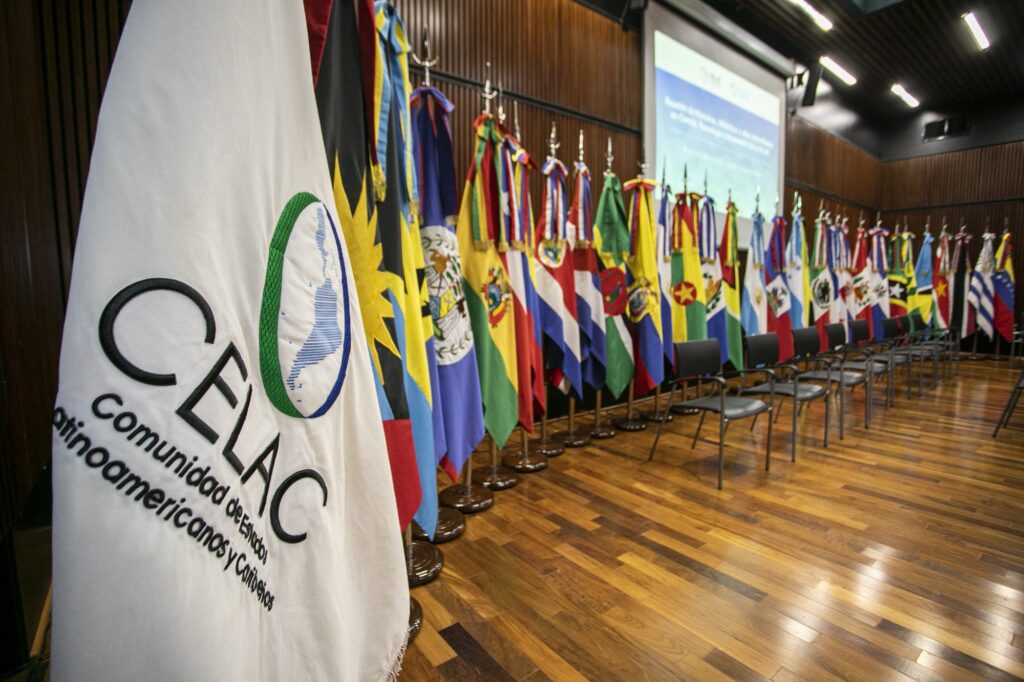
Flags of CELAC and all member countries of the community. File photo.

Orinoco Tribune – News and opinion pieces about Venezuela and beyond
From Venezuela and made by Venezuelan Chavistas

Flags of CELAC and all member countries of the community. File photo.
Caracas (OrinocoTribune.com)—On Thursday, a majority of member countries from the Community of Latin American and Caribbean States (CELAC) expressed deep concern over the recent US military deployment in the region. They also reaffirmed their commitment to combat drug trafficking within the framework of international law.
Colombian President Gustavo Petro, who holds the group’s pro tempore presidency, released the information. He clarified that it was not a full consensus statement due to opposition from a minority of nine countries.
The following nations expressed concern about the US military threats: Antigua and Barbuda, Barbados, Belize, Bolivia, Brazil, Chile, Colombia, Cuba, Dominica, Grenada, Guatemala, Honduras, Mexico, Nicaragua, Saint Kitts and Nevis, Saint Lucia, Saint Vincent and the Grenadines, Suriname, Uruguay, and Venezuela.
President Petro releases a CELAC statement for peace in the region. Argentina, Costa Rica, El Salvador, Ecuador, Guyana, Paraguay, Peru, Jamaica and Trinidad and Tobago didn’t sign it. Only 9 countries out of 33 are playing US imperialist tunes. https://t.co/EOIWEP4nqj
— Orinoco Tribune (@OrinocoTribune) September 5, 2025
Commitment to Zone of Peace
The statement recalls that the region of Latin America and the Caribbean has been proclaimed as a “Zone of Peace.” This commitment, adopted in 2014 by all member states, is based on principles that include the prohibition of the threat or use of force, the peaceful settlement of disputes, the promotion of dialogue and multilateralism, unrestricted respect for sovereignty and territorial integrity, non-interference in the internal affairs of states, and the inalienable right of peoples to self-determination.
The text also highlights the Treaty for the Prohibition of Nuclear Weapons in Latin America and the Caribbean (Treaty of Tlatelolco) as a valid international treaty and a historic milestone. This treaty made the region the first densely populated area in the world free of nuclear weapons. The presence of a US nuclear submarine off the coast of Venezuela represents a violation of the treaty.
Furthermore, the statement’s signatory countries recognized transnational organized crime and drug trafficking as a significant threat to peaceful and inclusive societies. They reaffirmed their commitment to combating them as a priority by increasing regional and international cooperation and coordination within the framework of respect for international law.
President Petro disclosed the countries that objected to the declaration, which has been referred to as a “very principled and non-ideological declaration.” These countries’ unwillingness to sign the declaration made their submission to US imperialism quite clear. The objecting countries were Argentina, Costa Rica, Ecuador, El Salvador, Guyana, Jamaica, Paraguay, Peru, and Trinidad and Tobago.
Call for respect of international law
The statement was followed by President Petro’s urgent exhortation, on Friday, that the United States government respect international law. This came after the detection and destruction of a small boat allegedly carrying drugs in the Caribbean Sea near Venezuela, announced by President Trump last Tuesday. According to US officials, the attack on the boat killed 11 individuals.
“If the US government does not care about the UN and international law, I do,” President Petro wrote in a public statement.
Petro stated that his government’s collaboration in the fight against drug trafficking is profound but is subject to international law. He emphasized that under his administration, Colombia does not collaborate in killings and uses force proportionally, as defined by international treaties.
“The United States government, if it respects international law, has my full support, but if it violates it, we must rebuild our collaboration,” wrote President Petro. “Under my administration, Colombia does not collaborate with murderers.” Thus, the Colombian president hinted that he might revise Colombia’s collaboration with the US.
Venezuela’s FM Criticizes Marco Rubio for Disrespecting UN (+ US Bases in Ecuador)
This is the unofficial translation of the statement signed by the majority of CELAC countries:
Antigua and Barbuda, Barbados, Belize, Bolivia, Brazil, Chile, Colombia, Cuba, Dominica, Grenada, Guatemala, Honduras, Mexico, Nicaragua, Saint Kitts and Nevis, Saint Lucia, Saint Vincent and the Grenadines, Suriname, Uruguay, and Venezuela, as countries that make up the Community of Latin American and Caribbean States (CELAC), express their deep concern about the recent extra-regional military deployment in the region.
In this regard, it is recalled that Latin America and the Caribbean have been proclaimed a Zone of Peace, a commitment adopted by all Member States and based on principles such as the prohibition of the threat or use of force, the peaceful settlement of disputes, the promotion of dialogue and multilateralism, unrestricted respect for sovereignty and territorial integrity, non-interference in the internal affairs of states, and the inalienable right of peoples to self-determination.
We also emphasize that the Treaty for the Prohibition of Nuclear Weapons in Latin America and the Caribbean (Treaty of Tlatelolco) constitutes a historic milestone that made our region the first densely populated area in the world free of this type of weapon. This treaty reflects our peoples’ commitment to peace, collective security, and the definitive prohibition of nuclear weapons as a means of coercion or threat.
We also recognize that transnational organized crime and drug trafficking constitute a significant threat to achieving peaceful and inclusive societies, and therefore reaffirm our commitment to combating them as a priority, increasing regional and international cooperation and coordination within the framework of respect for international law and compliance with current legal frameworks and international conventions.
The CELAC countries that signed this declaration call for the promotion of a safe environment and reiterate their firm commitment to the defense of peace, stability, democracy, and development throughout the region.
Special for Orinoco Tribune by staff
OT/JRE/SL